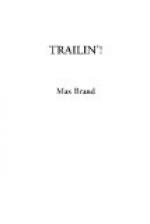To the chauffeur he said: “Home, and make it fast.”
They passed up Lexington with Maclaren “making it fast,” so that the big car was continually nosing its way around the machines in front with much honking of the horn. At Fifty-Ninth Street they turned across to the bridge and hummed softly across the black, shimmering waters of the East River; by the time they reached Brooklyn a fine mist was beginning to fall, blurring the wind-shield, and Maclaren slowed up perceptibly, so that before they passed the heart of the city, Woodbury leaned forward and said: “What’s the matter, Maclaren?”
“Wet streets—no chains—this wind-shield is pretty hard to see through.”
“Stop her, then. I’ll take the wheel the rest of the way. Want to travel a bit to-night.”
The chauffeur, as if this exchange were something he had been expecting, made no demur, and a moment later, with Woodbury at the wheel, the motor began to hum again in a gradually increasing crescendo. Two or three motor-police glanced after the car as it snapped about corners with an ominous skid and straightened out, whining, on the new street; but in each case, having made a comfortable number of arrests that day, they had little heart for the pursuit of the grey monster through that chill mist.
Past Brooklyn, with a country road before them, Woodbury cut out the muffler and the car sprang forward with a roar. A gust of increasing wind whipped back to Maclaren, for the wind-shield had been opened so that the driver need not look through the dripping glass and mingling with the wet gale were snatches of singing.
The chauffeur, partly in understanding and partly from anxiety, apparently, caught the side of the seat in a firm grip and leaned forward to break the jar when they struck rough places. Around an elbow turn they went with one warning scream of the Klaxon, skidded horribly at the sharp angle of the curve, and missed by inches a car from the opposite direction.
They swept on with the startled yell of the other party ringing after them, drowned at once by the crackling of the exhaust. Maclaren raised a furtive hand to wipe from his forehead a moisture which was not altogether rain, but immediately grasped the side of the seat again. Straight ahead the road swung up to meet a bridge and dropped sharply away from it on the further side. Maclaren groaned but the sound was lost in the increasing roar of the exhaust.
They barely touched that bridge and shot off into space on the other side like a hurdler clearing an obstacle. With a creak and a thud the big car landed, reeled drunkenly, and straightened out in earnest, Maclaren craned his head to see the speedometer, but had not the heart to look; he began to curse softly, steadily.
When the muffler went on again and the motor was reduced to a loud, angry humming, Woodbury caught a few phrases of those solemn imprecations. He grinned into the black heart of the night, streaked with lines of grey where therein entered the halo of the headlights, and then swung the car through an open, iron gate. The motor fell to a drowsily contented murmur that blended with the cool swishing of the tires on wet gravel.




